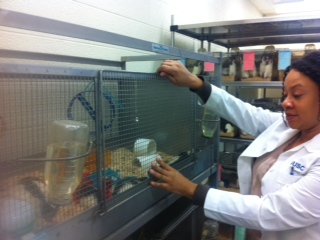- Home
- Behavioral Psychopharmacology Neuroscience Lab
at the University of Massachusetts Boston

Tiffany Donaldson’s research is focused on understanding the intersect of biological (e.g., sex and personality traits) and environmental factors that create vulnerabilities to drug addiction. She uses a rodent model to explore biological sex differences and trait anxiety and pathways to drug addiction, and how these factors may make some rodents more sensitive to stimulant drugs, more likely to show impulsive behavior and relapse. She breeds her own trait anxiety animals at the UMass Boston vivarium to create high (HAn) and low anxiety (LAn) animals to explore the cellular and molecular factors to create this stimulant drug vulnerability profile. She is also interested in the biology-environment interaction and using early intervention such as closed nesting (CN) environments during pre-weaning, brief periodic maternal separation and enrichment strategies to reverse vulnerable states.
The Behavioral Psychopharmacology lab is a behavioral neuroscience research lab at the University of Massachusetts Boston focused on studying understanding the intersect of biological (e.g, sex and personality traits) and environmental factors that create vulnerabilities to drug addiction.
The lab utilizes different techniques and analytical approaches to address its scientific goal by combining intra-cranial cannulation and injection, a host of behavioral testing (e.g., anxiogenic and repeated stress stimuli, cognitive, operant learning, activity) and post-mortem protein and cell morphology analysis (e.g., immunocytochemistry, Western blots, Golgi stain).
Under the direction of Dr. S. Tiffany Donaldson the lab supports PhD students, volunteers, and undergraduates in their research and educational developmen
